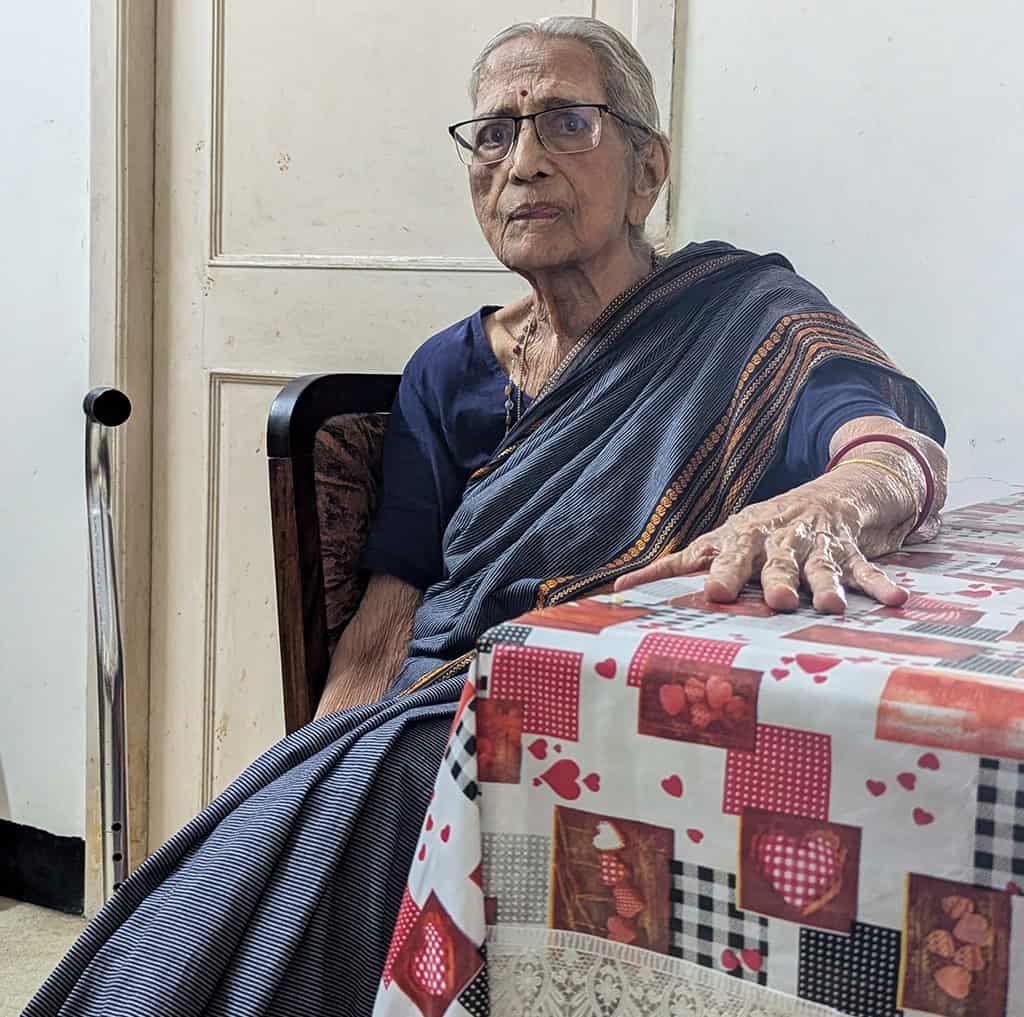It was a warm, inviting afternoon in Mylapore when I made my way to the home of Radha Shekar, a radiant 91-year-old with a graceful presence and a glint of mischief in her eyes. As someone who has read and practised Maria Montessori’s methods in my classroom, meeting someone who had studied under her directly felt surreal – like stepping into a page of living history.

Radha’s daughter-in-law Lakshmi welcomed me with a kind smile and a steaming cup of filter coffee, accompanied by a plate of perfectly crisp biscuits – the kind that remind you of childhood visits to your grandmother’s house. The clock struck two as we settled down. She eased into her chair and asked with a playful grin, “Now, where shall we begin?”
The room was modest and quiet, there were no distractions – only her, and her stories.
I asked gently, “Do you remember the time you met Maria Montessori? What was she like?”
Radha’s eyes softened. “Yes… I remember her sitting quietly while we played with wooden blocks. She observed, she listened. She never interrupted. She had a presence that made you feel seen without feeling judged.”
Curious, I asked, “What did a typical day feel like in that space?”
“It was peaceful,” she replied. “We played a lot. There was music, laughter, and movement. No rush, no shouting. The classroom was a big hall – spacious and open – and that space made a difference. You could move freely. We sang songs – not nursery rhymes, mind you – but Tagore’s songs, Bharathiyar’s verses. Everyone joined in. There was no embarrassment, only joy. That’s what helped children come out of their shells.”
“How did your experience with Montessori shape the way you viewed education?” I asked.
Radha leaned back, thinking. “We never felt excluded. There was no discrimination between boys and girls. Everyone did everything – laying the mats, arranging, helping and putting things back. Maria called us ‘Mother’s Little Helpers’. That idea stayed with me. Children weren’t pushed into roles – we grew into them naturally. We were trusted, and that trust made us responsible.”
She recalled how they rarely carried books. “But we learnt so much. We learnt by doing, by watching, by being present. There was a music teacher who came once a week. And oh, the joy of building blocks! I still remember how satisfying that was – stacking, arranging, imagining.”
I asked her, “Looking back, what do you think Maria Montessori would say about the world today?”
She chuckled softly. “She’d be surprised – and perhaps a bit sad. Today’s children are under such pressure. Everything’s about results. Parents want IAS and IPS officers from the first grade!” She paused and then added with a smile, “Maria would have brought reforms – big ones. She would have said: Let children be children first.”
We spoke of her life beyond the classroom. “I studied Sociology after I got married,” she said proudly. “When my daughter asked how I managed exams at that age, I just laughed. You see, the Montessori years gave me the confidence to try to keep learning. I had also studied a bit of psychology. That helped me understand people better, especially children.”
She showed me a tiny doll she had made from a chocolate wrapper – simple, clever, delightful. “This,” she said, “is Montessori. Finding ideas in everyday things. Making something with your hands. That’s creativity nurtured early on.”
“What would you want today’s teachers and parents to remember most about children?” I asked.
Radha’s tone grew firm but kind. “That children don’t need rewards and punishments – they need presence. They need someone to sit beside them, not above them. Talk to them. Don’t rush them. The teacher must be like a farmer – knowing which seed will flourish in what kind of soil. And for that, early-grade teachers must be trained. Not just trained – they must understand child psychology deeply. That’s the root of good teaching.”
She sighed. “Modern parenting is too mechanical. So much routine, so little conversation. We need more dialogue – between parents and children, between teachers, parents and children. Without that, we’re just passing time, not passing on wisdom.”
Before I left, she spoke gently of the world she sees now. “Children are caught in a web of competition. Social media, expectations, pressure – it’s too much. We need to teach them to take the middle path, like the Buddha said. Not everything is a race. Sometimes, just walking peacefully is enough.”
As I stepped out of her home, the afternoon had mellowed into a soft golden hue. I felt I had been gifted not just stories, but a way of seeing – slow, thoughtful, and deeply respectful of childhood. Maria Montessori may no longer walk among us, but her legacy lives on in people like Radha Shekar – and in those of us willing to listen.